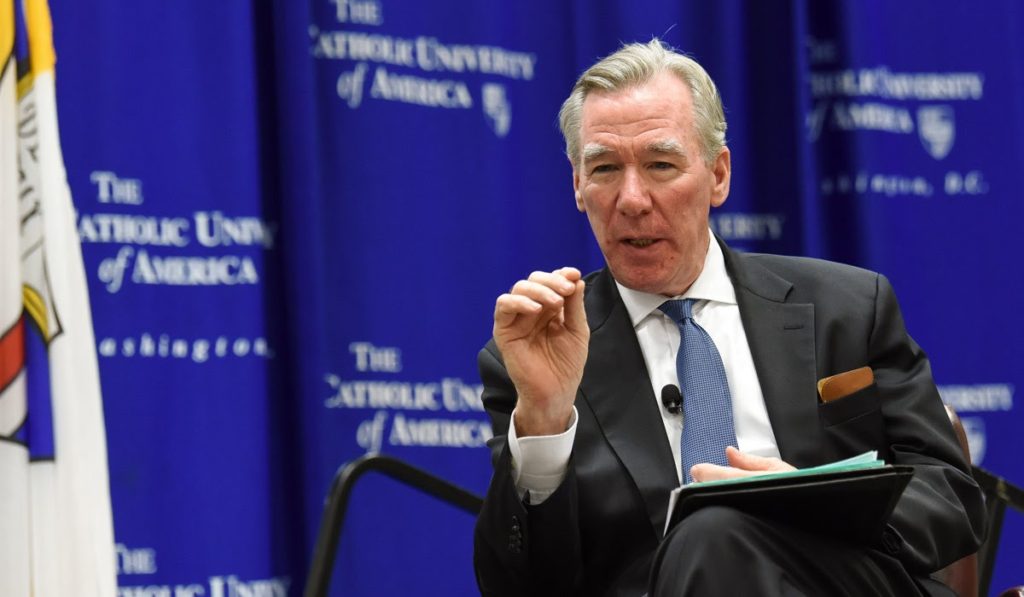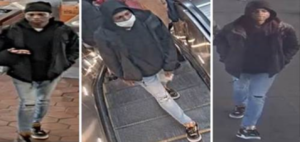SGA Class of 2022 Town Hall

Image Courtesy of Catholic University
By Caroline Morris
Catholic University’s Student Government Association (SGA) held a virtual town hall on October 26 from 7-8 p.m. with University President John Garvey to answer questions about the future of the Class of 2022.
Student Government Association President Gerald Sharpe and Garvey hosted the town hall via Zoom with contributions from Vice President for Student Affairs Judi Briggs Garbuio, Director of Campus Activities Steve Kreider, and Vice Provost for Teaching and Dean of Undergraduate Studies Lynn Mayer.
SGA sent an email to the junior class the week prior to the town hall with a Google Form on which students could submit questions for Garvey. The Zoom webcast also allowed for live question submission and a “raise hand” button for students to speak directly to the hosts. The questions focused primarily on the future of the junior class, including whether they would be allowed back on campus in the spring, housing logistics, and the possibility of in-person classes. The following paragraphs detail questions posed by students and the panel’s answers.
Why were freshmen chosen to go back this Fall?
Juniors have been upset with the choice to allow freshmen on campus when upperclassmen have more specialized courses that require on campus resources more. Garvey maintained his position on the choice to allow only freshmen on campus.
“We were afraid [the freshmen] would just never get attached to the institution unless we can bring them in and give them a full sort of experience,” Garvey said. While administration does not regret this decision, they are also cognizant of the fact that this choice did come at the detriment of upperclassmen. He commented “I hate it” about the problem this has caused for upperclassmen and expressed how anxious CUA is to open in the spring.
How well is the University handling COVID-19 cases?
There are about 600 residential students living at Catholic now, as well as many students off campus. Garvey did acknowledge the spikes of cases they had early on, but maintained a positive attitude toward the university’s COVID-19 safety procedures, including statistics that only 40% of cases have been on campus and that there is only one positive case on campus at the moment.
“We’re more open than any other university in the city, and we’ve learned a lot,” Garvey said. “I think we’ve got to a point now where it’s pretty safe on campus.”
Will the juniors be able to return to campus in the spring? What does this mean for classes, housing, and facility usage?
The big topic on everyone’s mind was about the likelihood of juniors being able to return to campus next semester and what that means for the living situation, in-person classes, and facility usage. Garvey was very clear in his intention to allow those in need of university facilities, such as architecture students or those in the music school, onto campus for building use. In regards to the question about juniors being allowed to live on campus and take in-person classes, Garvey was quite positive:
“The answer to both is yes, I think.”
He did distinguish that there were two variables when referring to “reopening.” One is that of in-person classes, and the other is housing.
“We would like to be as open as our capacity permits,” Garvey said in regards to in-person classes. He also acknowledged that there were a few variables they needed to consider, including having faculty who feel safe and willing to teach in person, space for classroom availability given distancing measures, and the timing of schedules given the necessity of cleaning procedures after each class.
Garvey was unable to give a definitive timeline for when students will know about in-person classes, as collecting the data to determine which classes can meet in person takes “longer than you might suppose,” Garvey said.
The other aspect of reopening is housing. Students recently were allowed to fill out a housing application for the spring semester and 578 students requested to be considered for on-campus housing, of which 140 were juniors. According to Garbuio, there are a few more applicants than beds available, but they are trying to accommodate.
Garbuio said that juniors will be moved into “traditional residence halls,” which include Regan, Ryan, Flather, Caldwell, Seton, and Gibbons. This poses a problem for juniors, as they have already spent their freshman year in many of these dorms and because these dorms do not have suites. This means that upperclassmen, who are typically not forced to have meal plans, will have to share a communal kitchen with a large residence hall. This is a significant shock to juniors, as seen in the question posed by Steve Kreider on behalf of students submitting comments through the Q&A function, addressing the negative effects of this housing decision for upperclassmen who have already “paid their dues” in communal residence halls and meals plans.
There was an explanation of this decision to place juniors in freshman dorms and keep freshmen in upperclassman dorms.
“It would be really difficult for [first years who have already settled on campus] to be then redistributed throughout the campus community and other environments,” said Garbuio.
The hopeful deadline for releasing housing assignments is December 7th.
Will students be able to defer on-campus residence and finish the semester at home in the event of a switch to online classes or by choice?
Garbuio confirmed that Catholic U “will be very clear in [their] communication for those of you that are interested in on-campus housing about what the deadline would be to accept or not commit to the housing for the spring semester.” It was also confirmed that students may decide to finish this year entirely online.
How can we trust the university’s word? What is the contingency plan for the spring?
An anonymous student addressed the fact that the university committed to opening for the fall semester and then “blindsided us last minute” with a switch to online. Garvey addressed this as a matter of hope and adherence. The university waited so long to change the plan because it was committed and hopeful to staying open, but with a spike of COVID cases in D.C., they had to adhere to an order that would not allow them to bring everyone back to campus. This same issue persists to the plans for the spring. The university remains committed to bringing students back, but the progression of the virus, the legal environment, and the decisions of the city will affect the university’s ability to do so.
Garvey did feel confident that if students are allowed back on campus, it will not result in a similar situation to the spring 2020 semester where all students were sent home. One of the benefits of having freshmen on campus is that “it has given [the university] some practice” in how to deal with COVID spikes. Rather than send students home when cases spike, they run the cases through the inventory of classes, and if certain classes reach a predetermined percentage of infections, those classes will move online for a quarantine period.
There is a change to the spring semester calendar.
Classes will begin on January 25 and the University will cancel spring break, also minimizing Easter break to reduce COVID cases brought to the university through travel.
Study Abroad, Sports, Mental Health, and COVID-Vaccines
The Town Hall also touched on a few other topics briefly. Mayer discussed that because Study Abroad programs have been stopped for the spring, their focus is on summer programs. Garvey expressed his interest in allowing sports teams to play in the Landmark Conference, but that is yet to be confirmed. He also expressed pride in the mental health assistance the university is offering through the counseling center. When asked if the university will require students to get a COVID vaccine if it were created using aborted fetal stem cells, Garvey reiterated his thoughts given during the last town hall on COVID vaccines using aborted fetal stem cells, saying, “No, I don’t think we will.”
Faculty pay cuts
The concerns of students about faculty pay cuts were addressed, and Garvey revealed that the university has lost 46 million dollars as a result of the pandemic. Cuts have had to be made, but there have been as many efforts as possible to keep jobs and a liveable salary for all.
Final Words
Throughout the town hall, Garvey maintained that the university was committed to having students back on campus in the spring. Though the virus may change and the future of the city cannot be predicted, Garvey sustained his positivity: “I’m hopeful.”







